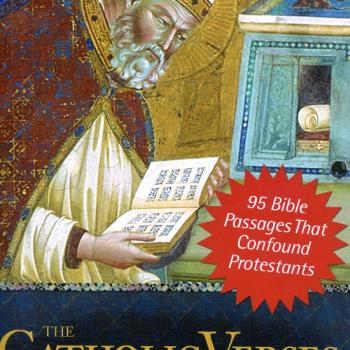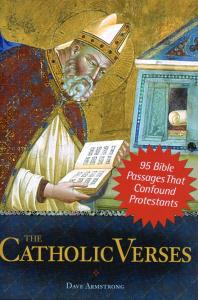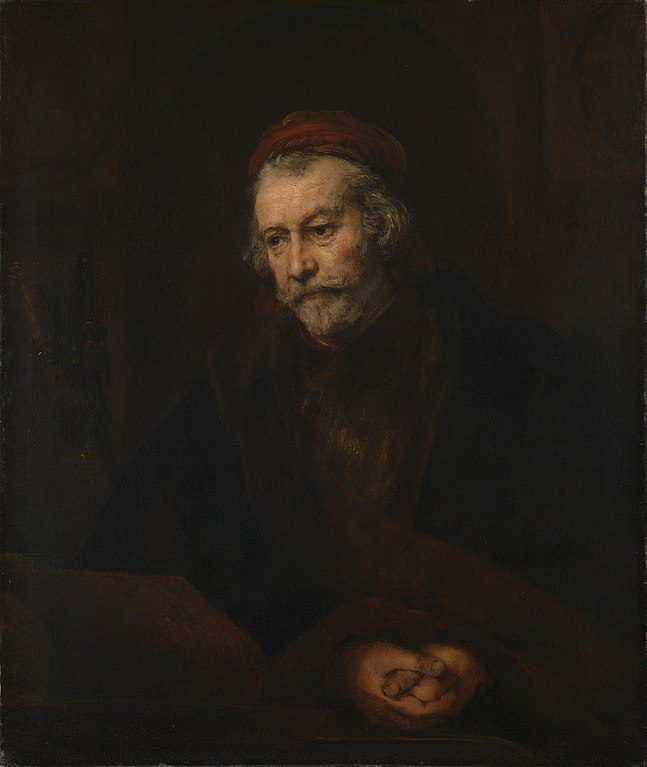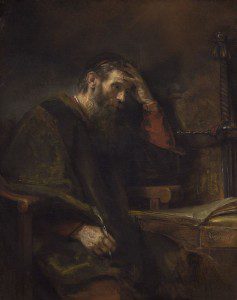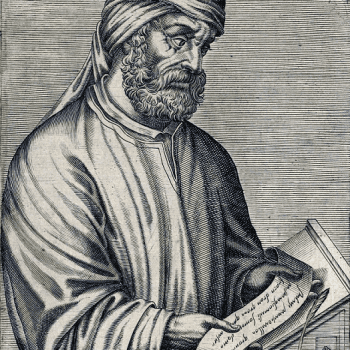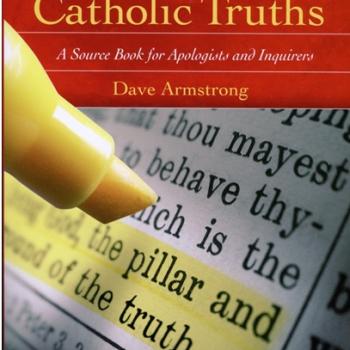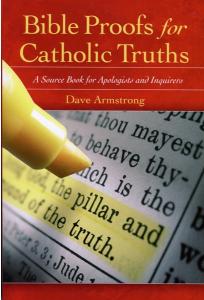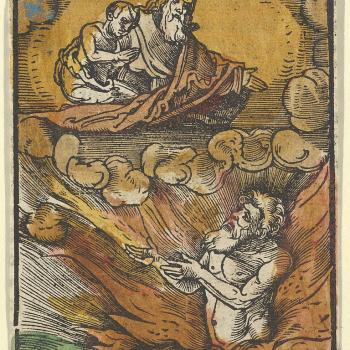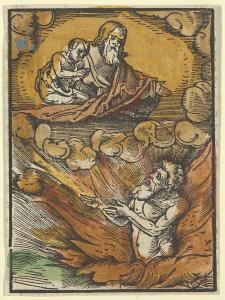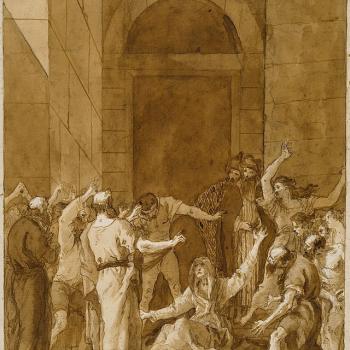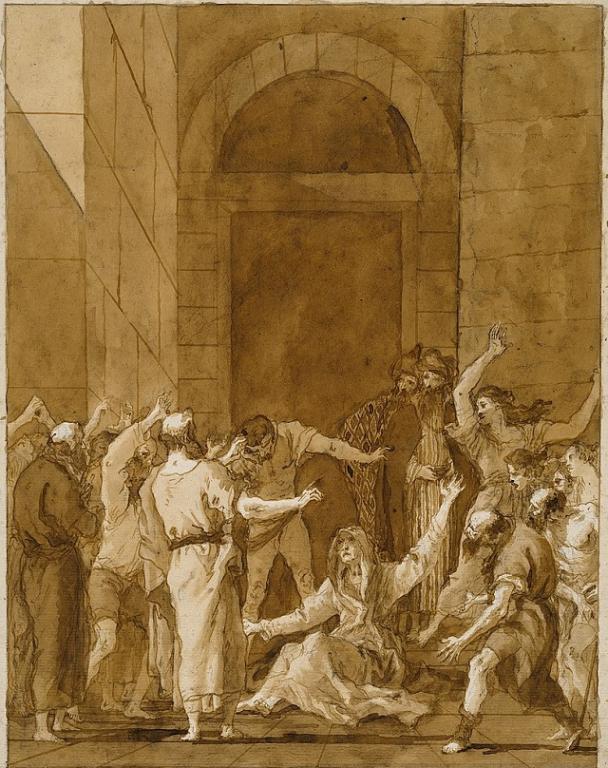
Gavin Ortlund is an author, speaker, and apologist for the Christian faith, who serves as the senior pastor of First Baptist Church of Ojai in Ojai, California. Gavin has a Ph.D. from Fuller Theological Seminary in historical theology, and an M.Div from Covenant Theological Seminary. He is the author of seven books as well as numerous academic and popular articles. For a list of publications, see his CV. He runs the YouTube channel Truth Unites, which seeks to provide an “irenic” voice on theology, apologetics, and the Christian life.
I greatly admire and appreciate Gavin’s ecumenical methodology, and viewpoint. It’s extremely refreshing to hear in this hyper-polarized age. He is an exemplary Christian role model of this open-minded, charitable approach. We all learn and “win” when good, constructive dialogue takes place. It’s never a “loss” to arrive at more truth or to recognize one’s own error.
*****
This is a reply to his video, “Purgatory: A Protestant Perspective” (12-7-21). Gavin’s words will be in blue.
Gavin starts by noting that Catholic apologists often claim that “everybody” (i.e., of the Church fathers) believed in purgatory. I grant that the belief is not as universal as some of these claims would make out, and that eastern fathers tended to not believe in it (or at least not in the western, “Latin” more developed manner), according to the somewhat different course of eastern Christian theology. On the other hand, it’s likely that I think it was more widely believed than Gavin thinks it was, and I would agree with Cardinal Newman (see below), that it was “almost a consensus” [my italics]. St. John Henry Cardinal Newman wrote in his landmark book, Essay on the Development of Christian Doctrine, in 1845:
Some notion of suffering, or disadvantage, or punishment after this life, in the case of the faithful departed, or other vague forms of the doctrine of Purgatory, has in its favour almost a consensus of the first four ages of the Church, though some Fathers state it with far greater openness and decision than others. It is, as far as words go, the confession of St. Clement of Alexandria, Tertullian, St. Perpetua, St. Cyprian, Origen, Lactantius, St. Hilary, St. Cyril of Jerusalem, St. Ambrose, St. Basil, St. Gregory of Nazianzus, and of Nyssa, St. Chrysostom, St. Jerome, St. Paulinus, and St. Augustine. And so, on the other hand, there is a certain agreement of Fathers from the first that mankind has derived some disadvantage from the sin of Adam.
Next, when we consider the two doctrines more distinctly,—the doctrine that between death and judgment there is a time or state of punishment; and the doctrine that all men, naturally propagated from fallen Adam, are in consequence born destitute of original righteousness, we find, on the one hand, several, such as Tertullian, St. Perpetua, St. Cyril, St. Hilary, St. Jerome, St. Gregory Nyssen, as far as their words go, definitely declaring a doctrine of Purgatory: whereas no one will say that there is a testimony of the Fathers, equally strong, for the doctrine of Original Sin, though it is difficult here to make any definite statement about their teaching without going into a discussion of the subject.
On the subject of Purgatory there were, to speak generally, two schools of opinion; the Greek, which contemplated a trial of fire at the last day through which all were to pass; and the African, resembling more nearly the present doctrine of the Roman Church. And so there were two principal views of Original Sin, the Greek and the African or Latin. . . .
It may be observed, in addition, that, in spite of the forcible teaching of St. Paul on the subject, the doctrine of Original Sin appears neither in the Apostles’ nor the Nicene Creed. (University of Notre Dame Press, 1989, with a foreword by Ian Ker, from the 1878 edition of the original work of 1845, Introduction, sections 15-16, pp. 21-23)
I’ve poured an enormous amount of energy into researching this. I’m really excited about this video, to share it with you all: probably more excited about this video than any other video I’ve done thus far. [0:30-0:42]
Excellent. That will make the video even better then. I, too have written a great deal about this topic, and love to discuss it. So I look eagerly forward to this exchange.
A lot of Protestants don’t really have a good conception of what purgatory is. [3:58 -4:03]
Very true. Nor do a lot of Catholics, I would add. Gavin then helpfully cites the Catholic Catechism for a solid definition.
Purgatory is not hell. [4:30-32]
Good.
Purgatory is not a second chance at salvation, okay? The people who go to purgatory are already saved. . . . Purgatory is not necessarily a place. . . . Recent popes have clarified it’s more of a condition of existence . . . The fire of purgatory . . . this is not necessarily literal fire . . . most people probably wouldn’t see it as literal fire today. [4:41-5:30]
Agreed all down the line.
Gavin expresses as a Protestant concern, the aspects of corruption of the doctrine of purgatory “on the ground” in the late Middle Ages, and says that this can’t be overlooked in a Protestant-Catholic discussion on purgatory. I think we mostly agree on that.
There’s a lot of financial manipulation of the laity [in the late Middle Ages, prior to Protestantism]. [10:01-07]
The Council of Trent agreed in its Decree on Purgatory (1563):
[T]his holy Council commands the bishops to strive diligently that the sound doctrine of purgatory, handed down by the Holy Fathers and the sacred Councils, be believed by the faithful and that it be adhered to, taught and preached everywhere.
But let the more difficult and subtle questions which do not make for edification and, for the most part, are not conducive to an increase of piety (cf. I Tim. 1:4), be excluded from the popular sermons to uneducated people. Likewise they should not permit opinions that are doubtful and tainted with error to be spread and exposed. As for those things that belong to the realm of curiosity or superstition, or smack of dishonorable gain, they should forbid them as scandalous and injurious to the faithful. [my italics]
Gavin distinguishes the “historical reality” from “official Catholic doctrine.” Excellent! He notes that Trent “condemned” abuses of the doctrine of purgatory (while thinking “they didn’t go far enough”). This acknowledgment of internal Catholic reform is so often not done in Protestant analyses. For many Protestant apologists, such excesses are in fact the official doctrines: so they mistakenly think. Or else they don’t take the time to make the crucial distinction that Gavin makes (even though they may be aware of these factors). This is one of many reasons why I have such great respect for Gavin’s presentations.
See also my related articles: Myths and Facts Regarding Tetzel and Indulgences [11-25-16; published in Catholic Herald]
The Biblical Roots and History of Indulgences [National Catholic Register, 5-25-18]
He notes that purgatory is inherently connected with many other Catholic beliefs and practices such as the Sacrifice of the Mass, prayers for the dead; indulgences, merit, penitential practices, etc. Of course it is. Catholic theology is a harmonious, interrelated organic entity. Each of these doctrines and practices can be defended from Holy Scripture and patristic history.
He mentions that Martin Luther and his successor Philip Melanchthon were not averse to prayer for the dead altogether, but only opposed the Sacrifice of the Mass and various other Catholic practices regarding the dead in purgatory. Very good again. I commend him for making (no doubt) many Protestants aware of this, who were previously ignorant of it. He stated that John Wesley affirmed a “duty” of praying for the dead and that C. S. Lewis believed in purgatory in some fashion. Nevertheless, the vast majority of Protestants today reject all prayers for the dead.
Gavin referred to doctrinal “accretion.” Catholics (and many non-Catholics) would say that doctrinal development (including for purgatory) is a legitimate thing, which retains the essence of a doctrine from beginning to end. Development is not evolution, in other words, in which one thing changes into something entirely different. The Catholic Church condemned the evolution of dogmas (I believe, in the time of Pope St. Pius X or earlier). “Accretion” is defined as “things that slowly kind of build up along the way throughout Church history, but that don’t authentically relate back to the aposto0lic deposit of the first century. . . . Purgatory is that; it’s an accretion.” [22:35-50]
This is precisely what Cardinal Newman would regard as a doctrinal corruption; the opposite of a consistent growth (in understanding) and development of the apostolic deposit. Thus, the stage is set for the fundamental debate: is purgatory an accretion / corruption that is not found in the apostolic deposit, or is it a development that is found there?
Let me start by acknowledging the strength of the Catholic claim against me from Church history. It is true, first of all, that the practice of praying for the dead is extremely common and extremely early. Second of all, one can also find wide usage of the language of cleansing, post-mortem fire throughout Church history. . . . You can find that language a lot and it comes in, relatively early on. [23:38-24:12]
He then notes that Catholic apologists “often overstate” their case “by ignoring all the countervailing evidence and . . . by taking anything that sounds remotely like purgatory: any kind of language of cleansing fire, and sort of glossing over all the differences and acting as though there’s this one, singular idea that goes back to the beginning.” [24:12-24:33]
Sure; that can and does happen. On the other hand, I think Gavin has to realize that these differences do not generally depart from the essence of the matter of purgatory. If it is not an essential difference being discussed, between one Church father and another, then it’s simply the working-out of development over time. Different understandings and particulars are believed in and discussed, and some of these will go the route of manifesting themselves as heretical in due course (Tertullian strayed after teaching great and orthodox things; Origen seemingly believed in universalism, etc.), while others are in the “orthodox” stream of development.
Gavin appears to agree with this outlook when he states: “What you have is so many competing ideas that gradually, slowly start to coalesce into a singular idea.” [25:29-38] That exactly describes Newmanian development, as long as the “competing ideas” compete within the same category of the essence of purgatory. So, for example, if one Church father thought purgatory was part of hell, or that it was permanent, neither would be a consistent development, and would be heretical.
All of this would be altogether expected under the theory of development (Cardinal Newman discusses them in the greatest detail), and is therefore not a refutation of same. It all comes down to, as I said, whether things are consistently developing or are accretions / corruptions of what came before.
And we can see these elements as part of the apostolic deposit because they are in the Bible itself. The Apostle Paul prayed for the dead Onesiphorus, as I have written about and debated many times. He stated what I believe was penances for the dead in referring to Christians being “being baptized on behalf of the dead” (1 Cor 15:29, RSV). In Holy Scripture baptism is often used in the sense of afflictions and penances (“baptism of fire”); as in Matthew 3:11, Mark 10:38-39, Luke 3:16, 12:50.
If this is what Paul had in mind, the passage makes perfect sense: he is talking about penances on behalf of the dead. I have called this “the most UnProtestant verse in the Bible.” Paul in the same letter says that “the fire will test what sort of work each one has done” (1 Cor 3:13). I wrote a paper called 50 Bible Passages on Purgatory & Analogous Processes.
Many of these passages (of the 50) would fall under what Gavin characterizes as “anything that sounds remotely like purgatory: any kind of language of cleansing fire”. He seems to think that many or all instances of this are special pleading; straining at gnats to make a point; trying to fit a square peg into a round hole: to make it confirm purgatory. I’m not convinced of that. To me, all those motifs (the fifty I compile) show the very spirit and essence of purgatory, if not all the particulars, all the time (as we would expect of a primitive doctrinal kernel).
To use several relevant examples (I used KJV in this paper), God says He will “purge away thy dross” (Is 1:25) and “I have refined thee. . . in the furnace of affliction” (Is 48:10) and “I will put this third into the fire, and refine them as one refines silver, and test them as gold is tested” (Zech 13:9).
Moreover, God is described as having “washed away the filth of the daughters of Zion” and having “purged the blood of Jerusalem from the midst thereof by the spirit of judgment, and by the spirit of burning” (Is 4:4), and “cleans[ing] them from sin and uncleanness” (Zech 13:1) and it was written that “he shall purify the sons of Levi, and purge them as gold and silver, that they may offer unto the LORD an offering in righteousness” (Mal 3:3).
Paul says “he himself shall be saved; yet so as by fire” (1 Cor 3:15).
Peter refers to being “purged from his old sins” (2 Pet 1:9).
The writer of Hebrews says: “we have had fathers of our flesh which corrected us, and we gave them reverence: shall we not much rather be in subjection unto the Father of spirits, and live? [10] For they verily for a few days chastened us after their own pleasure; but he for our profit, that we might be partakers of his holiness” (Heb 12:9-10).
I don’t see — in light of all this — that anyone can claim, “God can’t possibly do these same sort of processes after death, to continue to purify, purge, and cleanse us.” All of these passages are a cumulative argument that this is indeed how God operates. There is nothing in the Bible, as far as I can see, that would prohibit any of this occurring after death (especially since we all agree that one must be actually holy — not just declared such — to enter heaven) as well as before death. These passages (and many more) make it altogether plausible to believe that they apply after death as well, within the notion of purgatory. It’s not special pleading; it’s considering all of the relevant biblical data and evidence, like every good Bible student and theologian ought to do. It’s systematic theology.
Gavin cites Clement of Alexandria (c. 150-c. 215) and Origen (c. 185-c. 254) as the earliest to use “purgatorial” language. If we’re not counting the biblical writers, I would agree (so does The Oxford Dictionary of the Christian Church).
Then you’ll find various statements about cleansing fire in Lactantius, and in Ambrose, and in Jerome, and in Augustine . . . [26:16-23]
Agreed, as far as it goes . . . In my book, Catholic Church Fathers: Patristic and Scholarly Proofs (ch. 4: “Purgatory and Prayers for the Dead”), I also include in this category, Cyprian, Hilary of Poitiers, Gregory of Nyssa (“purged of the filthy contagion in his soul by the purifying fire”: Sermon on the Dead), and Caesar of Arles (“we shall have to remain in that purgatorial fire as long as it takes for those above-mentioned sins to be consumed like wood and straw and hay”: Sermon 179 [104] ). Cardinal Newman added in the citation above, Tertullian, St. Cyril of Jerusalem, St. Basil the Great, St. Gregory Nazianzus, St. John Chrysostom, and St. Paulinus. That’s a total of 14 Church fathers, and most of the most influential ones.
Famous Protestant historian Philip Schaff summarized the fathers’ views in this regard as showing “a strong tendency to the Roman Catholic doctrine of Purgatory.” Regarding the use of the word “fire” he wrote: “The common people and most of the fathers understood it of a material fire” (History of the Christian Church, vol. 2, chapter XII, § 156: “Between Death and Resurrection”). These are his scholarly and expert and Protestant conclusions, not my amateur, lay, and Catholic-biased ones.
Note also that the significant development of the doctrine (as was the case with the Immaculate Conception) began in the east (Clement of Alexandria, Origen), and it was held by several prominent eastern Church fathers, including Gregory of Nyssa, Cyril of Jerusalem, Basil the Great, Gregory Nazianzus, and John Chrysostom: exactly half of the 14 fathers mentioned. These include the “Three Holy Hierarchs” of eastern tradition (Basil, Gregory Nazianzus, and John Chrysostom).
So this was not a western-only doctrine. It was held in the east and west, which is a great indication of apostolicity. If the later eastern fathers and eastern Catholics and (400 years afterwards) the Orthodox rejected it, then that is simply yet another instance of many of the east going notoriously and widely astray. They notoriously did so with regard to things like Christology and iconoclasm and divorce. Why not also purgatory? Even Origen was wrong insofar as he thought all men went through purgatory (he being a universalist, as Gavin notes). So he got the doctrine right but the application to human beings wrong. In any event, the Christian east’s own proclaimed greatest eastern fathers agreed with the essential doctrine (just as many of them agreed with the controversial filioque or something quite close to it). And that is very significant and telling.
One can cite a father in partial agreement. This isn’t dishonest (in Catholic presentations), unless something is stated like “all these fathers believed in the same doctrine in all its particulars.” Fathers can get bits and pieces wrong. Gavin himself, after all, cited Origen as one of the first to talk about purgatory, and so do Jaroslav Pelikan, Schaff, The Oxford Dictionary of the Christian Church, as well as Cardinal Newman. There is nothing wrong with this or (not necessarily in every case) “misleading.” He clarifies that Origen also had erroneous views; so do I in repeating what he said and agreeing.
Gavin claims that Catholics often take St. Cyprian out of context (his Epistle 51). He says it is about this life; therefore, irrelevant. I include this citation, myself, in my book on the fathers. I would say three things:
1) the analogy of such “purging” / “purifying” processes in this life are precisely an argument by analogy for what occurs — or may be speculatively thought to occur — in the next. So just as I use biblical arguments along these lines (many shown above), so Catholics can cite fathers speaking in the same vein.
2) St. Cyprian, in context, in this letter, refers to “it is one thing, when cast into prison, not to go out thence until one has paid the uttermost farthing”. This is pretty clearly, I think, a reference to Jesus’ words: “and you be put in prison; truly, I say to you, you will never get out till you have paid the last penny” (Mt 5:25-26, RSV; KJV has “uttermost farthing” here). There is an abundant patristic tradition of interpreting this passage as referring to purgatory. I detail this in my first book, A Biblical Defense of Catholicism, chapter 7 (pp. 129-130): “Purgatory”. It’s available online: search “Matthew 5:25-26” to get to the exact section, where I cite St. Francis de Sales, in turn mentioning many Church fathers’ interpretation of this passage.
3) This utterance is not the clearest thing in the world to interpret. I think, therefore, that there is leeway in interpretation, and we should give folks a “pass” if we disagree. But as I have demonstrated, many Church fathers interpret the biblical passage that Cyprian almost certainly has in mind, as referring to purgatory.
Therefore, I think one or more of the above considerations liberates Catholic apologists from the dreaded (and ubiquitous on both sides) charge of quoting out of context, as concerns the Church fathers.
Gavin then cites several portions of St. Cyprian that he thinks definitively settle the issue of whether he believed in purgatory. Gavin believes he didn’t. There might be some replies to some of that, but that would take a lot more work and I don’t have sufficient materials on hand to get into such a particular debate. Gavin might be right; I concede that. His citations were pretty good evidence. But if he is right about Cyprian, it would only mean that there were at least 13 Church fathers that taught purgatory, rather than 14. So that would not be a huge concession or “loss” in the overall scheme of things. Various Church fathers understand things better or worse than other ones do, and the earlier they are, the greater possibility that they may not understand later developed doctrines at all, or only quite inadequately.
Gavin notes that Tertullian was referring to Hades (not purgatory) when he spoke of “punishments” or “discipline” after life. But this is a classic example of a doctrine in its early stage of development. Certain things will be erroneous in light of how doctrines later develop. It’s correct insofar as he is talking about a third state besides heaven and hell in which souls undergo some sort of penitential and/or purgatorial suffering. Hades (or Sheol) before the death of Christ could be regarded as quite similar to purgatory after His death. Hades was referred to in this respect before the fifth century, as Philip Schaff generalized about early Church beliefs:
The majority of Christian believers, being imperfect, enter for an indefinite period into a preparatory state of rest and happiness, usually called Paradise (comp. Luke 23:41) or Abraham’s Bosom (Luke 16:23). There they are gradually purged of remaining infirmities until they are ripe for heaven, into which nothing is admitted but absolute purity. Origen assumed a constant progression to higher and higher regions of knowledge and bliss. (After the fifth or sixth century, certainly since Pope Gregory I., Purgatory was substituted for Paradise). . . . (History of the Christian Church, vol. 2, chapter XII, § 156: “Between Death and Resurrection”)
Thus, this is altogether to be expected. Cardinal Newman deals with this sort of thing all through his famous Essay on Development. As for Tertullian, it’s unclear to me if he is including penitential suffering of the righteous in his discussions on Hades or only sufferings of those who will end up in hell (in Treatise on the Soul, ch. 58, which I have in my Church fathers book). I’m inclined to slightly favor the latter interpretation at this point. In Luke 16, the “bad” part of Hades appears to be inhabited by the damned (whereas Lazarus was in the “good” part where heaven-bound souls were). It may be (I merely speculate) that some fathers (including Tertullian?) thought the “bad” part of Hades (per Luke 16) also included the saved who were undergoing purgation. This wouldn’t surprise me, seeing that it was such an early stage of development.
He cites Irenaeus who seems not to have referred to purgatory. Then he cites Hippolytus, who presents what I would say is a straightforward interpretation of Luke 16 and Jesus’ story about Lazarus and the rich man, which references Hades or what is often called “Abraham’s bosom”. He seems unaware of purgatory as well.
Gavin talks about “how incredibly diverse the patristic testimonies are on this topic.” [38:58-39:03]
How, then, can Protestant patristic scholar Philip Schaff characterize the early views as manifesting “a strong tendency to the Roman Catholic doctrine of Purgatory”? It’s a matter of degree. Yes, there could be, and were diverse views that existed (maybe even “incredibly” so), but the question is how prominent they were, and whether we can say there was any sort of patristic consensus on the matter. If there was that, even if it was a “plurality”, it seems that the later more highly developed view of purgatory was well on its way in development. And Cardinal Newman (no slouch) called it “almost a consensus of the first four ages of the Church” (his italics).
It either was or it wasn’t. If it was, then the historical situation is perfectly harmonious with what Catholics would expect it to be. If it wasn’t, that would pose a problem for our view. Gavin has proven the existence of notable exceptions, but if that is all they are — exceptions — then he has not proven his case that purgatory was a mere corrupt “accretion” and not an apostolic development of a biblical doctrine already present in a robust kernel form.
Gavin says that Lactantius taught that “everybody” experiences some sort of judgment with fire at the Judgment Day. This would be another aspect of differences in early development. He thinks it all happens on Judgment Day, whereas now Catholicism holds that it begins at the death of the person who still has sins to be purged. I would say this is not of the essence of the doctrine. Purging of sin is the essence: not exactly when it begins. He provides no references for Lactantius, but the quotation I have in my book has Lactantius stating that there is differential experience of such “fire” among the righteous, according to how sinful they are at death:
But when He shall have judged the righteous, He will also try them with fire. Then they whose sins shall exceed either in weight or in number, shall be scorched by the fire and burnt: but they whom full justice and maturity of virtue has imbued will not perceive that fire; for they have something of God in themselves which repels and rejects the violence of the flame. (The Divine Institutes, Book VII, chapter 21; ANF, Vol. VII)
So that is two categories of the dead righteous: precisely as Catholicism teaches (one experiences purgation; the other does not). The same chapter includes what he thinks happens to the damned. I didn’t include it in my book because I was referencing purgatory, not damnation. Lactantius indeed refers to “The same divine fire” but he also holds that people react to it differently, according to whether they are saved or damned, and among the righteous, according to how sinful they are. So he writes about the reprobates:
[T]he sacred writings inform us in what manner the wicked are to undergo punishment. For because they have committed sins in their bodies, they will again be clothed with flesh, that they may make atonement in their bodies; and yet it will not be that flesh with which God clothed man, like this our earthly body, but indestructible, and abiding for ever, that it may be able to hold out against tortures and everlasting fire, . . .
The same divine fire, therefore, with one and the same force and power, will both burn the wicked and will form them again, and will replace as much as it shall consume of their bodies, and will supply itself with eternal nourishment: which the poets transferred to the vulture of Tityus. Thus, without any wasting of bodies, which regain their substance, it will only burn and affect them with a sense of pain.
Thus, he teaches a “three-tier” afterlife, exactly as Catholicism does (i.e., three states: two eternal and one temporary). All are afflicted by “fire” but differently, according to which of the three categories they fit into. The most righteous “will not perceive” it. This is, of course, far closer to the Catholic view than any Protestant view. I don’t see how it supports Gavin’s overall case.
Gavin, citing a scholar, contends that Ambrose is a mixed bag on this issue. Maybe he is. I’ll “give” him this one and move on.
Jerome . . . uses the language of “fire” exclusively for hell . . . [43:25-30]
I have two passages in my book where Jerome uses the language of “fire” in the sense of purgation of the righteous:
Just as we believe there are eternal torments for the devil and all the naysayers and impious persons who say in their heart: “There is not God.” So too, for sinners and impious persons who are, nevertheless, Christians, whose works are to be tried in the fire and purged, we think that the sentence of the Judge will be tempered and blended with clemency. (Commentary on Psalms 18, 66, 24)
If the man whose work is burnt and is to suffer the loss of his labour, while he himself is saved, yet not without proof of fire: it follows that if a man’s work remains which he has built upon the foundation, he will be saved without probation by fire, and consequently a difference is established between one degree of salvation and another. (Against Jovinianus, Book II, 22; NPNF 2, Vol. VI)
Gavin says Augustine’s views are “complicated and open-handed” [44:07-11]. He cites him sounding tentative and speculative. But again, we would expect this. Purgatory was not yet a dogma at this time. Augustine died in 430. That’s still very early and before even several Christological and trinitarian doctrines were fully developed (Chalcedon was 21 years after his death). This doesn’t count for evidence that Augustine wasn’t sure about the doctrine, in terms of his own belief.
I also edited the book, The Quotable Augustine: Distinctively Catholic Elements in His Theology I included the citation Gavin gave, from the Enchiridion. I also included another from that book, and six from City of God (from chapters 20-21). I won’t cite them here, as this is already long enough. But what Gavin cited doesn’t overturn the notion that Augustine believed in purgatory: and rather explicitly so for his time.
Gavin states that Ephraem and Aphrahat believed in soul sleep. Aphrahat refers absurdly to a “happy sleep” and a “disturbed sleep” (maybe dreams?). I’ll take Gavin’s word for it. This is a heresy: opposed even by John Calvin. I was writing about it way back in 1981, in my first major excursion into apologetics: a refutation of the Jehovah’s Witnesses, who also believe in this unbiblical nonsense (as did, apparently, Martin Luther). Again, just because they believed that, does not undermine my contention that the fathers exhibited “a strong tendency to the Roman Catholic doctrine of Purgatory” (Schaff) and “almost a consensus of the first four ages of the Church [for purgatory]” (St. Cardinal Newman). These “anomalies” (sorry!) simply don’t prove the case that Gavin wishes to make.
I agree that there is such a thing as praying for the dead without presupposing purgatory (Protestants — like Lutherans — have a few versions of exactly that), so we need not argue that point. Nevertheless, I highly suspect that most of the fathers who refer to praying for the dead do so with that in mind: we are helping conscious souls suffer less and get to heaven sooner.
Gavin cites Ambrose, Funeral Oration of Theodosius (in my book), but denies that purgatory is referenced. Jacques Le Goff (The Birth of Purgatory, University of Chicago Press, 1984, 60) disagrees with his interpretation:
[Ambrose] clearly stated that the prayers of the living could help to relieve the suffering of the dead, that suffrages could be of use in mitigating the penalties meted out in the other world.
People have honest disagreements about these things.
Gavin cites Gregory Nazianzus and Cyril of Alexandria and makes a good case that they seemed to not have a conception of purgatory. More “points” for him. But does this and the rest that he has produced disprove a “near consensus” and “strong tendency to the Roman Catholic doctrine of Purgatory”? No. Folks in the east got a lot of things wrong. This should not surprise anyone familiar with the Christological controversies and heresies or, for example, the iconoclastic controversy. I wrote in a 1997 article of mine:
Both East and West acknowledge wrongdoing in the tragic events leading up to 1054 when the schism finalized. Nevertheless, it is undeniably true that the West (and especially the Roman See) had a much more solid and consistent record of orthodoxy. For example, the Eastern Church split off from Rome and the Catholic Church on at least six occasions before 1054:
The Arian schisms (343-98)
The controversy over St. John Chrysostom (404-415)
The Acacian schism (484-519)
Concerning Monothelitism (640-681)
Concerning Iconoclasm (726-87 and 815-43)
This adds up to 231 out of 500 years in schism (46% of the time)! In every case, Rome was on the right side of the debate in terms of what was later considered “orthodox” by both sides. Thus, the East clearly needed the West and the papacy and Rome in order to be ushered back to orthodoxy.
I once asked an Orthodox priest who was invited to my group discussion at my house about this, and he sat there stunned and silent. Imagine that: eastern Christianity was in schism with Rome for the first 44 years of Augustine’s life (and eleven more before his birth) because it was enthralled with Arianism (which believes that Christ was created), and eleven more years of Augustine’s life because it couldn’t figure out that St. John Chrysostom was a good guy. Then it took the east 41 years to determine that Jesus Christ had both a divine and a human will (contra Monothelitism). So they split with Rome again over that. Then it took them a combined total of 89 years to come to the realization that iconoclasm was wrong: during which time they (you guessed it) split with Rome.
So why should anyone be surprised that they split off for good in 1054? They had had a lot of practice, and were wrong every time, just as they were wrong again in 1054. So they rejected popes and ongoing ecumenical councils. They definitely believed in the latter in the early years; then they suddenly ceased. Go figure. I summarized the sad history of heretical patriarchs in the east in the first millennium in that 1997 paper:
These historical facts may be briefly summarized as follows: All three of the great Eastern sees were under the jurisdiction of heretical patriarchs simultaneously during five different periods: 357-60 (Arian), 475-77, 482-96, and 512-17 (all Monophysite), and 640-42 (Monothelite): a total of 26 years, or 9% of the time from 357 to 642. At least two out of three of the sees suffered under the yoke of a heterodox “shepherd” simultaneously for 112 years, or 33% of the period from 341 to 681 (or, two-thirds heretical for one-third of the time), and at least 248 of these same years saw one or more of the sees burdened with sub-orthodox ecclesiastical leaders: an astonishing 73% rate.
Thus the East, as represented by its three greatest bishops, was at least one-third heretical for nearly three-quarters of the time over a 340-year span. If we examine each city separately, we find, for example, that between 475 and 675, the patriarchs of Constantinople, Alexandria, and Antioch were outside the Catholic orthodox faith for 41%, 55%, and 58% of the time respectively. Furthermore, these deplorable conditions often manifested themselves for long, unbroken terms: Antioch and Alexandria were Monophysite for 49 and 63 straight years (542-91 and 475-538 respectively), while Constantinople, the seat of the Byzantine Empire and the “New Rome,” was embroiled in the Monothelite heresy for 54 consecutive years (610-64). There were at least (the list is not exhaustive) 41 heretical Patriarchs of these sees between 260 and 711.
One can see the chart of these “bad patriarchs” in that paper. We hear about “bad popes” all the time (and there weren’t that many, and none formally heretical). We don’t hear so much about these lousy, pathetic patriarchs, most of whom couldn’t even get the doctrine of Christ right.
Gavin denies that St. John Chrysostom believed in purgatory and that he believed that “when you die, you go straight to heaven.” [54:35-55:07]. He says that Chrysostom believed in praying for everyone, even those in hell. But this doesn’t disprove that he held to some form of purgatory. He thought Mary sinned, too. Virtually every father had some belief that was wrong according to Catholicism or Protestantism or Orthodoxy or all three.
But many Christians believe (and I think — without checking — that the Catholic Church allows such a belief) that there is differential punishment in hell just as there are differential rewards in heaven. St. John Chrysostom expresses this very thing in his Homily on 1 Corinthians 15:41. If so, it make some sense to pray for lost souls that they would receive lesser punishment. But it seems to me that that is more or less a “retroactive” prayer that goes back to how God judges them within the purview of damnation.
It’s also Catholic teaching that we know virtually nothing about the identity of anyone in hell, save for Judas. We simply don’t know. So we can pray in charity for all men, even after they die, to be saved, even if we don’t believe in purgatory, because we don’t know if they were sentenced to hell or not. God is outside of time. He can answer such a prayer that applies to the “past” from our perspective.
Gavin cites passages from Chrysostom which he thinks affirm that he thought dead believers always go straight to heaven. But here’s another passage from my book:
But grant that he departed with sin upon him, even on this account one ought to rejoice, that he was stopped short in his sins and added not to his iniquity; and help him as far as possible, not by tears, but by prayers and supplications and alms and offerings. For not unmeaningly have these things been devised, nor do we in vain make mention of the departed in the course of the divine mysteries, and approach God in their behalf, beseeching the Lamb Who is before us, Who taketh away the sin of the world;—not in vain, but that some refreshment may thereby ensue to them. Not in vain doth he that standeth by the altar cry out when the tremendous mysteries are celebrated, “For all that have fallen asleep in Christ, and for those who perform commemorations in their behalf.” For if there were no commemorations for them, these things would not have been spoken: since our service is not a mere stage show, God forbid! yea, it is by the ordinance of the Spirit that these things are done. Let us then give them aid and perform commemoration for them. For if the children of Job were purged by the sacrifice of their father, why dost thou doubt that when we too offer for the departed, some consolation arises to them? since God is wont to grant the petitions of those who ask for others. . . . Let us not then be weary in giving aid to the departed, both by offering on their behalf and obtaining prayers for them: for the common Expiation of the world is even before us. Therefore with boldness do we then intreat for the whole world, and name their names with those of martyrs, of confessors, of priests. For in truth one body are we all, though some members are more glorious than others; and it is possible from every source to gather pardon for them, from our prayers, from our gifts in their behalf, from those whose names are named with theirs. Why therefore dost thou grieve? Why mourn, when it is in thy power to gather so much pardon for the departed? (Homily XLI on First Corinthians, 8; NPNF 1, Vol. XII)
If all believers go straight to heaven (no purgatory or other intermediate state at all, let alone purgation), I have several questions about the above:
1) Why does Chrysostom never indicate that this is prayer for their salvation, rather than for “consolation” and “purg[ing]”?
2) If indeed he was talking about praying for their salvation, wouldn’t he place that in the context of stating, “approach God in their behalf, beseeching the Lamb Who is before us, Who taketh away the sin of the world . . .”? Instead, he adds, “that some refreshment may thereby ensue to them.” That’s certainly not a synonym for salvation. You can’t have “some salvation.”
3) Even when Chrysostom refers to “pardon” he says in one place, “so much pardon” which indicates differential degrees, whereas salvation is either present or not (no degrees).
4) If he was referring to praying for their salvation, why do the words “save” or “saved” or “salvation” or “eternal life” never appear in the entirety of the Homily 41 on First Corinthians?
5) if they are in heaven already, why does Chrysostom urge his hearers to “give them aid”? Why would they need any aid, if they are in eternal bliss, in union with God, in heaven?
All of this makes much more sense if referring to some kind of intermediate state or purgatory rather than to heaven. This particular homily or portion of a homily is on 1 Corinthians 15:46. The entire 58-verse chapter is referring to Christians all the way through. So it seems reasonable that Chrysostom is here referring to those who are saved. Gavin says if they were saved, then Chrysostom thinks they went right to heaven. But if that is the case then I think my five questions must be grappled with. Purgatory seems to be the reasonable solution and key to interpretation.
Does this development have an anchor in Scripture? Does it go back to the apostles? Does it go back to Christ? Does it go back to Holy Scripture? [1:05:10-19]
I gave an outline of my arguments along these lines above. I say “yes”: purgatory is found in primitive, kernel, seed form, just as we would expect it to be, under the outlook of Newmanian development.
The process of purification happens relatively instantaneously upon arrival in heaven: something like what is envisioned in I John 3:2: [“we know that when he appears we shall be like him, for we shall see him as he is”]. . . . upon the sight of God you will be made perfect. . . . the only question is: is the process by which a Christian is completely purified instantaneous, or relatively instantaneous, or is it a long, protracted kind of torment? [1:06:21-1:07:01]
I have stated something very similar for years, so I’m glad to see Gavin agree. For example, I wrote in my first book, A Biblical Defense of Catholicism (completed in 1996):
Protestants agree that real (not merely declared or imputed) holiness is a requirement for Heaven, but disagree with the purification process, believing instead in some sort of instantaneous transformation at death for the redeemed. Thus, in Protestantism, both salvation and ultimate glorification are essentially one-time events, whereas in Catholicism, they are durational processes (both belief-systems are logically consistent with their premises). (p. 120)
The Bible itself — closely examined — doesn’t compel us to think that God’s work of grace in each soul is instantaneously completed at the moment of physical death. (p. 122)
I reiterated this in my book, The Catholic Verses: 95 Bible Passages That Confound Protestants (2004):
There is no Protestant-Catholic difference on this particular point. The only difference is a quantitative one: Catholics think this cleansing will involve a process, like our life on earth. And that process of sanctification can continue after death: in purgatory. Protestants, on the other hand, seem to think this all occurs in an instant.
One Protestant I was interacting with, stated: “God will certainly remove the filth of the flesh prior to the resurrection of our bodies.” Precisely, and that is what purgatory is; no Protestant should have the slightest objection to it. The big beef is (or should be) about how long this removal of filth takes, and exactly when it occurs. Both sides agree that the thing itself does occur in some fashion. (pp. 157-158)
I would say that the passages I have already provided indicate that a process is involved. Particularly, St. Paul, referring to [Judgment] “Day” (1 Cor 3:13) then states: “If any man’s work is burned up, he will suffer loss, though he himself will be saved, but only as through fire” (1 Cor 3:15). I suppose one could say this was an instantaneous “zap”; but I submit that the plain and prima facie reading of the passage implies at least some process, taking into consideration the many analogous passages about purification, being refined in a furnace, etc. Usually when the Bible refers to our suffering, it’s a long and agonizing process. We don’t like it, but He thinks it’s good for us. Who are we to second-guess Him?
Paul in Romans 8 strikingly states that we are “children of God” and “heirs of God and fellow heirs with Christ”. But a condition must also be met: “provided we suffer with him in order that we may also be glorified with him” (Rom 8:16-17). He goes on to say, “I consider that the sufferings of this present time are not worth comparing with the glory that is to be revealed to us” (Rom 8:18). All of this is very much in line with what I have called the “spirit of purgatory.” Good spiritual things often come with great suffering. This is undeniable, repeated biblical teaching. But it all has great purpose and what we gain is so great in comparison that the sufferings are virtually nothing in comparison. It’s all consistent with what Catholics believe purgatory is about.
Gavin says that 1 Corinthians 3 refers specifically to “ministry work” and claims that the “fire” portion is being taken out of context. If this is true, then it couldn’t apply to everyone with regard to purgatory. I engaged in this very debate in 2007, over against the contentions of Reformed Baptist apologist James White. Here was my reply (I won’t indent it because it’s so long):
White attempts to make the passage apply only to Christian workers; those in ministry; the ordained, etc. I think this fails because, while there are indeed references to Christian workers: those who evangelize and teach, etc., there are just as many indications that Paul also generalizes his teaching. Even beyond that, one must remember that Paul is writing to the entire church at Corinth. The all-inclusiveness of what he is writing about is indicated more than once:
3:11: For no other foundation can any one lay . . .
3:12: Now if any one builds on . . .
3:14: If the work which any man has built . . .
3:15: If any man’s work is burned up, . . .
The next two verses after the passage under consideration (also the context) are clearly general: intended for all in the Corinthian church to whom he is writing:
[16] Do you not know that you are God’s temple and that God’s Spirit dwells in you? [17] If any one destroys God’s temple, God will destroy him. For God’s temple is holy, and that temple you are.
Anyone who has God’s Holy Spirit inside of him is a Christian, because all who are truly God’s are indwelt with the Holy Spirit. This can’t possibly refer to simply Christian workers. Paul continues the general language in the next verse (3:18):
. . . If any one among you thinks that he is wise in this age, let him become a fool that he may become wise.
Moreover, in verse 4:5 [a passage Gavin brought up] Paul refers again about rewards after death:
Therefore do not pronounce judgment before the time, before the Lord comes, who will bring to light the things now hidden in darkness and will disclose the purposes of the heart. Then every man will receive his commendation from God.
Most of the entire context of the passage (both before and after) is in generalized language. Paul even explains exactly why he mentioned himself and his co-worker Apollos:
[6] I have applied all this to myself and Apol’los for your benefit, brethren, that you may learn by us not to go beyond what is written, that none of you may be puffed up in favor of one against another. [7] For who sees anything different in you? What have you that you did not receive? If then you received it, why do you boast as if it were not a gift?
As usual, Paul uses his own example (by the grace of God) as one to imitate (4:14-16). Thus, we see the parallelism of the example of himself as a Christian worker and apostle applied generally to all Christians. Note how he writes in 3:7:
So neither he who plants nor he who waters is anything, but only God who gives the growth.
That was in the immediate context of his work with Apollos. But he clearly generalizes that to all Christians in similar language in 4:7:
For who sees anything different in you? What have you that you did not receive? If then you received it, why do you boast as if it were not a gift?
In other words, all men are under God; He gives the grace; we cooperate with Him in that grace or can reject it (see. e.g., 9:24-27). And man’s works will ultimately be judged and rewarded or burned up. Therefore, considering all of this relevant context (especially 4:5-6), it is clear that the “purgatorial” judgments in 3:13-15 apply to all men, not just Christian workers.
3:16 and 3:17b plainly refer to (indwelt) Christians, so it stands to reason that the preceding section of 3:11-15 does also. Paul only provided himself as an example of the general principle that all we have is from God, by His grace (3:7 <—-> 4:7), and we can choose to build upon that grace and empowerment or destroy it. But the hypothetical person referred to in 3:17a is not saved in the end, since God “destroy[s]” him. This is a different notion entirely from that of 3:15, where a person’s work is “burned up” but he is “saved, but only as through fire.”
You really don’t find purgatory unless you’re already looking for it. [1:08:51-54]
And I would retort (since Gavin wishes to make this analysis of motive and intent) that, by the same token, maybe Protestants don’t and won’t see purgatory in Scripture because their preconceived theology and notions are so foreign to it that it wouldn’t even “register” if it confronted them “square in the face” from Scripture. Bias works both ways. We can only make our exegetical arguments. Gavin made his regarding 1 Corinthians 3 and I had already responded a length to it 15 years ago, with a ton of Bible (my usual methodology). As I always say: let readers judge who has a more plausible, convincing argument. Gavin makes his case well. He’s a formidable theological opponent. I think I do pretty good as well, if I do say so.
Gavin says there is a lot about heaven and hell in Scripture (I disagree about heaven, and many Bible commentators have noted how Jesus spoke much more about hell), and so little about purgatory. Again, it depends on what one is looking at and what one considers as evidence or “on-topic.” There actually is quite a bit, and I have presented it in many papers and several books. But many doctrines are “minimally presented” in the Bible: such as original sin and the virgin birth and the Two Natures of Christ: to mention three. That doesn’t make Protestants disbelieve in those things, despite having scanty biblical attestation. Nor do they care about the canon of the Bible and sola Scriptura having no biblical evidence at all. They firmly believe in both, based on Catholic authority (minus the deuterocanon) and their own groundless tradition of men.
He mentions the thief on the cross going to be with Jesus in paradise. That clearly refers to Hades or Sheol, which is where Jesus went immediately after He died. He didn’t go to heaven until His Ascension, about 42 days later. Jesus is likely saying that the thief would be saved, and in the “good” part of Hades (Luke 16), but this has no bearing as to whether he also had to go through purgatory first. Given the nature of his crimes, it makes sense (from where we sit) that he would. Gavin seems to think this is a good argument against purgatory. I don’t see how. The passage only teaches us that the thief was saved. But since all in purgatory are saved (as Gavin agreed in the beginning of his video), then this doesn’t preclude his still having to endure purgatory.
Being “home with the Lord” or “with Christ” doesn’t preclude purgatory, which is the “anteroom of heaven.” We’re much more with him there than we are on earth, and Catholic teaching on purgatory holds that its joys are greater than any we experience here, though the sufferings are also more intense than any here. In any event, we are with God in a very real sense, even in purgatory, just as we often experience Him more intensely when we suffer. Hence, King David joyously affirmed: “Even though I walk through the valley of the shadow of death, I fear no evil;
for thou art with me; thy rod and thy staff, they comfort me” (Ps 23:4) and God told Paul, who was suffering intensely (many think he had an eye disease: the “thorn in the flesh”) and asked three times for healing: “My grace is sufficient for you, for my power is made perfect in weakness” (2 Cor 12:9). And in purgatory we have the joy of knowing we are saved and destined for heaven, since we are in a place where everyone is saved.
I think a lot of this debate hinges on what I would describe as an insufficient and incomplete Protestant understanding of both biblical suffering and biblical sanctification. It’s all a harmonious whole. Purgatory is consistent with what we know about sanctification and suffering. It’s simply extended to the afterlife. We have to be purged before we can enter heaven. We would be totally out of place there without being adequately prepared.
***
Practical Matters: Perhaps some of my 4,000+ free online articles (the most comprehensive “one-stop” Catholic apologetics site) or fifty books have helped you (by God’s grace) to decide to become Catholic or to return to the Church, or better understand some doctrines and why we believe them.
Or you may believe my work is worthy to support for the purpose of apologetics and evangelism in general. If so, please seriously consider a much-needed financial contribution. I’m always in need of more funds: especially monthly support. “The laborer is worthy of his wages” (1 Tim 5:18, NKJV). 1 December 2021 was my 20th anniversary as a full-time Catholic apologist, and February 2022 marked the 25th anniversary of my blog.
PayPal donations are the easiest: just send to my email address: [email protected]. You’ll see the term “Catholic Used Book Service”, which is my old side-business. To learn about the different methods of contributing, including 100% tax deduction, etc., see my page: About Catholic Apologist Dave Armstrong / Donation Information. Thanks a million from the bottom of my heart!
***
Photo credit: Photograph by “Zauberin” (3-17-13) [Pixabay / CC0 public domain]
***
Summary: Baptist pastor and apologist Gavin Ortlund does a thorough survey of the Church fathers & purgatory. I offer counter-arguments and also biblical evidence.
***


